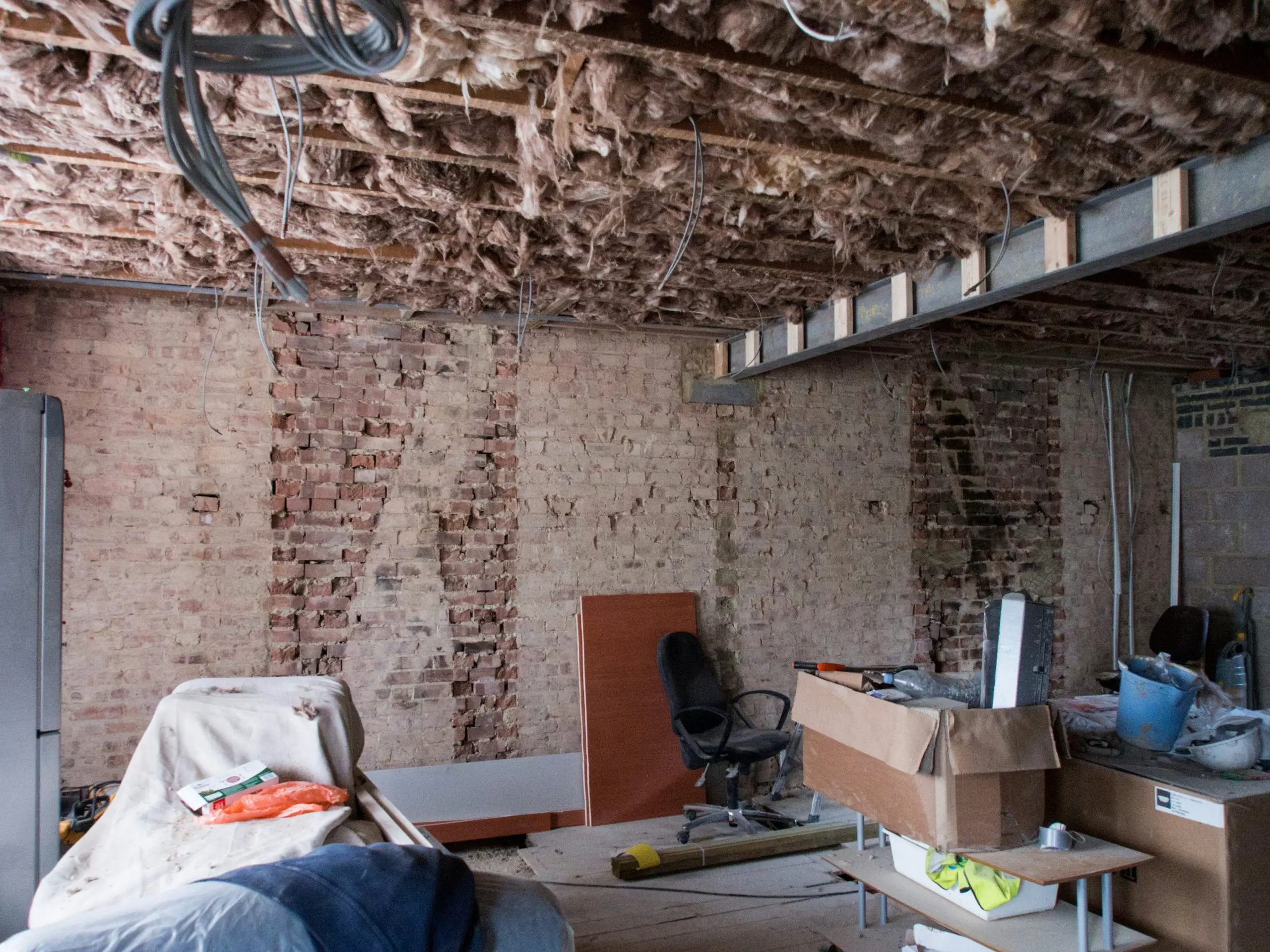Basement Renovation

Insulation is an easy and cost-effective way to make basement walls more resistant to moisture damage while simultaneously cutting energy costs.
There are various types of insulation, such as fiberglass batts and spray foam, to choose from for your basement renovation project. Selecting the ideal one depends on factors like budget, climate, and installation method – working with an experienced contractor should help make an easier selection decision.
Energy Efficiency
Prioritizing energy-efficient upgrades when renovating your basement can save money in the long run. For instance, adding insulation can prevent unwanted airflow and heat loss and significantly decrease energy use – saving both money and energy usage by furnace/AC systems alike! Furthermore, insulation also decreases moisture in the space which reduces chances of mold/mildew growth in your space.
An energy efficient basement can be finished at a fraction of the cost, adding significant value to your home. A well-insulated basement can be finished for much less than an unfinished one and should be considered an asset rather than an expense when adding extra bedrooms, home offices, kitchens or playrooms. In order to make your basement energy efficient it’s essential that any moisture problems or structural issues be corrected prior to adding insulation; moisture leakage issues need to be corrected prior to insulation being added on walls while any structural issues should be corrected prior to adding insulation on walls; any moisture related structural issues must be corrected before adding insulation on walls while any structural issues corrected before adding insulation on walls as this will improve energy efficiency and save costs overall when installing walls with insulation on them drywalls attached on them.
Based on your location and heating and cooling system, the R-value needed in your basement may differ. Higher R-values are essential in colder climates while lower values may suffice in warmer regions. Insulation materials vary in their ability to resist moisture penetration – an essential consideration in basements; where possible opt for spray foam or closed cell foam insulation that offers moisture resistance.
Installing basement wall insulation correctly means following the manufacturer’s instructions to ensure a successful and seamless application process. Hiring an experienced professional for such work will guarantee proper techniques are implemented that produce top-quality results.
Rigid foam board insulation is an excellent option for basements as its sheets make installation easy. Plus, its moisture resistance makes it the ideal choice. However, due to its rigid nature it may prove challenging around pipes and ducts; therefore for added flexibility consider pairing rigid insulation with flexible vapor barriers that offer greater permeability.
After installing basement wall insulation correctly, it is also important to regularly monitor for pest infestation. Pest infestation can damage insulation, leading to leakage that compromises its effectiveness and increase moisture infiltration into the area. In such instances, dehumidifiers may help control moisture infiltration to maintain dry insulation conditions.
Indoor Comfort
Insulation helps keep your basement warmer in winter and cooler in summer by blocking warm air from penetrating the walls, which causes cold spots in living spaces above, while simultaneously keeping out cool, dry air that could otherwise enter through vents in the roof or floor. As such, insulation helps heating and cooling systems operate more efficiently, helping save money over time on energy costs.
Insulating between your basement and first floor can significantly enhance indoor comfort. No longer will drafty winter mornings be met by oppressive heat in summer; instead you can enjoy year-round comfort within your own home.
Fiberglass insulation is an economical and popular choice for basement wall insulation, coming in rolls or batts that are easy to install. With its high R-value (thermal resistance), fiberglass can help increase energy efficiency as well as control moisture in your space. Spray foam provides another good choice, effectively sealing gaps and cracks while being available both open-cell or closed-cell formulations to meet individual requirements.
Rigid foam board insulation can be an ideal choice for basements. Installation using furring strips or 2×4 studs makes this type of insulation stand out, as its effectiveness doesn’t rely on gaps and voids being filled by other forms. Furthermore, moisture-resistant rigid foam board is beneficial in areas prone to dampness or mold growth in basements.
Consult a building inspector in your region or home to ascertain the necessary R-value. Higher R-values tend to be necessary in colder climates while lower values might suffice in milder areas. Also take into account any specific heating/cooling needs when making this determination.
Installing basement insulation is a relatively quick and straightforward project that can usually be finished within days, making it an attractive solution for homeowners who don’t wish to undertake major foundation renovations but simply wish to add insulation. It should be noted, however, that if your basement suffers from moisture problems it should first be addressed before adding insulation as otherwise it may become vulnerable to mold growth and cause permanent damage.
Reduced Moisture Damage
Investing in proper insulation when renovating your basement into a living space will keep it warm and dry – especially important if you reside in a cold climate. Plus, proper insulation will reduce energy bills!
Insulating basement walls is a relatively straightforward home improvement project, and you have various insulation types to choose from: fiberglass, cellulose, foam board and spray foam are just some options available to you. Your ideal choice will depend on factors like space type, climate conditions and budget – plus R-value; higher R-value means better heat retention capabilities.
Even if your basement isn’t used as living space, insulation should still be utilized to minimize moisture damage and minimize mold and mildew growth. Moisture damage can cause numerous issues including metal rusting, foul smells and mold growth – insulation will prevent this from entering your home and help trap warm air in your basement while keeping cool air flowing into other parts of your house.
Insulation can help you prevent costly water damage to your home by limiting heat loss and keeping moisture at bay, thus cutting energy costs while keeping your basement comfortable year round.
Proper basement insulation will save on your energy costs and safeguard the value of your investment in your home. It is a worthwhile investment when considering turning your basement into an extra bedroom, office space, playroom or gym; making your home more energy-efficient and safe is always worthwhile!
Water leaks in basements are a frequent cause of serious damage, often creating flooding conditions. Even slow drips from malfunctioning pipe fittings can lead to moisture intrusion – leading to corrosion of steel and aluminum components, carpet damage and mildew growth, all while creating the ideal breeding ground for mold growth. Insulation helps seal out moisture intrusion while decreasing repair times by locking moisture out.
Flooded basements can be devastating to homeowners. Whether caused by torrential rainfall or an improperly functioning sump pump, flooding in a basement can have severe repercussions that damage personal items and structural components alike. Insulation can help limit how much water enters into basements while prolonging their lifespan and protecting personal possessions from further water intrusion.
Reduced Repair Costs
Insulation can significantly lower repair costs associated with leaks and mold growth in basements, by minimizing heat transfer between cold air incoming from outside and the warm air inside, helping prevent condensation and moisture problems that plague basements, while simultaneously controlling temperature year-round to reduce energy use for climate control purposes – saving homeowners money on utility bills over time – paying back their investment in insulation in full over time.
Not only will a well-insulated basement help cut heating and cooling costs, it can also increase indoor comfort by reducing noise levels – perfect for use as a playroom, home theater or music room! Furthermore, such an addition will increase its value while making your property more desirable to potential buyers.
Though finishing a basement can involve extensive changes to a home’s major systems such as wiring and plumbing work, as well as making sure the HVAC can bring treated air into and out of underground rooms, it should not be attempted without professional assistance. Plumbing and electrical work usually require professional licensed electricians at around $1200-$2,000 on average per person for their services – not including fees associated with permits or inspections required by your city or town government.
Insulation should be at the forefront of any renovation to a basement. Insulating will protect against heat loss in winter while keeping temperatures cool in summer, and will also guard against drafts that could drain energy over time.
Insulating basement walls is an affordable solution for homeowners remodeling their home, and can be done either with furring strips or framing it into the walls. Rigid foam insulation offers great insulating value while being water resistant – professional contractors can quickly install it for an easy process, saving homeowners the cost and risk of errors that might lead to expensive repairs down the line.
Ready tо transform your chilly, damp basement into a comfortable haven? Proper insulation іs key! Explore options like fiberglass оr spray foam, find your perfect R-value, and watch energy costs plummet while reducing moisture and potential damage. For basement renovation cost navigate here and unlock a cozy, energy-efficient space!
















